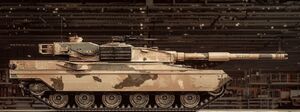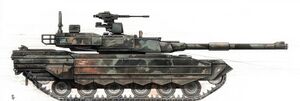Caracal Main Battle Tank
| Caracal Main Battle Tank | |
|---|---|
 The Caracal in its original production configuration | |
| Place of origin | Willink |
| Service history | |
| In service | 1996 to present |
| Used by | Willink |
| Production history | |
| Produced | 1996-present |
| No. built | in excess of 300,000 |
| Specifications | |
| Weight | ~60 Tons |
| Length | 7.6 m |
| Width | 3.6 m |
| Height | 2.5 m |
| Crew | 3 |
| Armor | Modular composite/ERA/blowoff panels |
Main armament | 125mm Bodosakis-B125C smoothbore |
Secondary armament | 7.62mm MG, .50 cal HMG |
| Engine | Phoebus 1500 turbocharged diesel 1,500 hp |
| Transmission | Hydromechanical, 6-speed automatic system |
Operational range | 550 km on-road, 400 km off-road |
| Speed | 65 km/h on-road, 45 km/h off-road |
The Bodosakis Caracal is a Willinkian main battle tank, first entering service with land units in 1996. Designed following Willinkian experiences operating Doomani and Questarian tanks in the 1970s and 1980s, the Caracal developed out of the challenges facing Willinkian armored doctrine, with a desire to economize and localize production, and to harmonize speed and firepower with advanced sensors and repairability. The Caracel quickly became the primary Willinkian main battle tank in service, variously supplemented by units operating Doomani Mad.III E and Mad.IV tanks, as well as Macabéan Nakil 1A2 and 1A1 tanks. Beginning in 2023, many Caracals have begun upgrade processes to bring their status to Block 2 , which features numerous major upgrades to electronics, data management, battlefield networking, armor, and optic systems, bringing the platform solidly into the "next generation".
Background
The Carcarel MBT emerged as a response to the evolving armored warfare doctrines of the 1980s and 1990s. Influenced by both Doomani and Questarian tank designs (notably the Mad.III E) the Carcarel sought to carve out a unique niche as a fast, heavily armed, and competently armored main battle tank optimized for Willink's varied operational environments. Bodosakis sought to prioritize flexibility, ease of maintenance, firepower and optics, and effective maneuver warfare in approaching design principles. As most military forces in Willink consist of various militas, ability to mothball and perform quick operational adjustments or repairs were a must, as well as a concerted effort to force down cost per man hour of operation.
